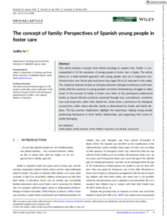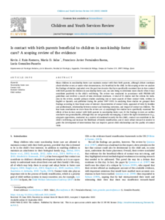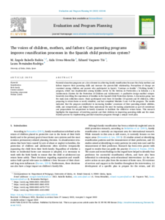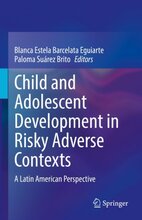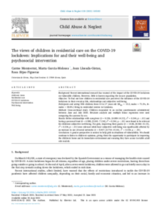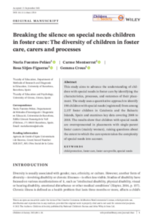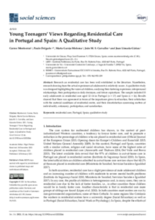Displaying 11 - 20 of 114
This article employs concepts from family sociology to explore how ‘family’ is conceptualised in 14 life narratives of young people in foster care in Spain.
In this scoping review the authors analyze the findings of studies conducted over the past two decades that have specifically examined face-to-face contact with birth parents for children in non-kinship foster care, with the goal of determining more clearly when it may contribute positively to the child's well-being. The review involved a search of nine electronic databases in Spain, the U.S., Portugal, and the UK.
The objective of this article is to identify those situations where the families of fostered unaccompanied migrant children are made visible in order to favor the incorporation of these families into the pathway planning. The fieldwork was carried out in Spain and involved working groups with specialized professionals.
This research highlights the importance of involving parents and their children in improving parenting skills and the reunification process by implementing parental education programs through a unique work plan. This study examined the experiences of families in the Spanish Child Protection System.
The causes of institutionalization are multiple and the impact it causes is reflected in different areas such as the development of the child in general, such as mental, psychic structuring, health, and nutrition. Psychologically, children present alterations in their cognitive, emotional, sexual, and social domains with a high probability of developing several pathological conditions. This chapter presents an overview of this phenomenon based on several research investigations carried out in Spain, Latin America, and Mexico.
Recent international research has warned of the impact of the COVID-19 lockdown on vulnerable children. However, little is known regarding the in-care population. The objective of this study was to find out how children in residential care perceived the influence of the COVID-19 lockdown in their everyday life, relationships and subjective well-being. Participants and setting: 856 children from 10 to 17 years old (Mage = 15.5, males = 71.2%, females = 28.8%) living in residential centres in Catalonia.
This study aims to advance the understanding of children with special needs in foster care by identifying the characteristics, processes, and outcomes of their placement. The study uses a quantitative approach to identify 190 children with special needs (registered) from among 2,157 foster children in Catalonia and the Balearic Islands, Spain and examines key data covering 2008 to 2018. The results show that children with special needs are overrepresented in placements with single-parent foster carers (mainly women), raising questions about the extent to which the care system takes the complexity of special needs into account.
In the present study, the authors explored the adult-child interactions that took place in 116 families from Spain: 28 long-term non-kin foster families, 34 adoptive families, and a community comparison group made up of 54 families.
Este informe presenta los hallazgos de una investigación por Amnistía Internacional en casos de sustracciones de menores en España durante los años del régimen franquista (1939- 1975) y hasta entrada ya la década de los noventa.
A qualitative study was designed highlighting the voices of children, analysing their fostering experience, interpersonal relationships, their participation in daily decisions, and future aspirations.

